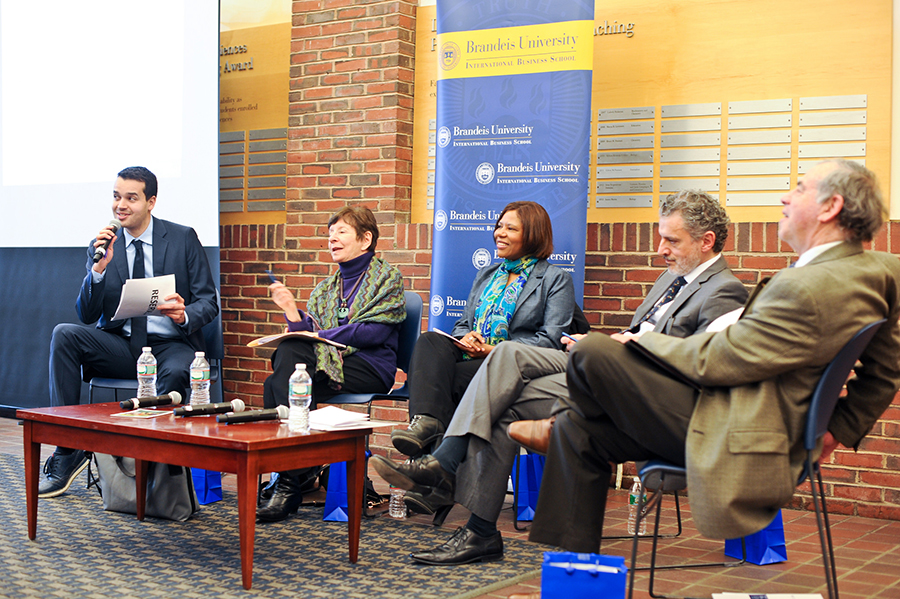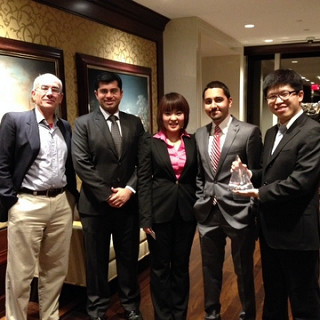
Brandeis International Business School’s Brazil Symposium drew a large crowd of students who sought to not only learn more about the recent riots in Brazil but, ultimately, the social, political, and financial impact they can have on a nation—and a globalizing economy.
In recent years, Brazil has emerged as a key international player, utilizing its vast resources to garner global attention—and the winning bids for both the 2014 World Cup and the 2016 Summer Olympics.
However, that is only half of the story.
Since 2013, the country has dealt with an increased state of social unrest and massive protests that began last June. In the process, these riots have shed light on pressing public concerns that range from lack of sufficient health care and quality of public transportation to the education infrastructure and political corruption.
On March 4, the International Business School brought that discussion to the United States—and to its Brazil Symposium. Distinguished guest panelists, including Natalicia Tracy, Executive Director of the Brazilian Immigrant Center and Ed Morata, CEO of Eneas International, presented on the topic in front of an impressive crowd of Brandeis students and faculty.
The panel also featured Dr. Elizabeth Leeds, Research Affiliate at the MIT Center for International Studies and Founder and Honorary President of Brazilian Forum for Public Safety, as well as Dr. Richard Lockwood, Adjunct Lecturer at the Heller School and President of Lockwood Nutrition Services.
Dr. Moises Lino e Silva, Lecturer in Anthropology and International & Global Studies as well as coordinator of the Brandeis IBS Brazil Initiative, opened his remarks with a challenge:
“[The riots are] not just about bus fare, not just about gay rights, not just about the projects built for the World Cup, not just about indigenous rights – they were all these things at once, and that is part of the puzzle we had here,” he said.
Tracy and Morata, as well as a host of other guest speakers, proceeded to tackle the puzzle from a variety of perspectives.
Leeds elaborated on the corrupt, oppressive nature of police brutality, topics she seeks to address with her work in Brazil. Lockwood, meanwhile, explored both the government’s influence on social policies and matters pertaining to the rural sector. As a business leader, Morata spoke about the lack of both sound economic policies and a clear long-term development model for the country. In addition, panelists discussed the status of a middle class that confronts alarmingly inadequate public services, and as a result, have joined in the protest.
The Symposium, moderated by Lino e Silva, not only sought to address the links between these various issues, but also, provide an understanding of and generate solutions to the riots that have garnered global attention.
And while Rio de Janeiro may be 4,844 miles away from Boston, the Symposium discussed how these protests might impact this summer’s World Cup, the outcome of the October 2014 presidential election and the Olympics.
As stated by Lino e Silva, unless more substantive reforms are introduced, the riots will endure. International Business School Dean Magid re-affirmed that notion, adding that the influence of social media and other global protests may fuel continued unrest.
The panelists, though, came to a consensus on one matter to conclude the discussion: their empathy for a working citizenry of Brazil that is advocating for nothing more than basic, fundamental rights. "If you've ever fought for any social cause in your life you feel touched when you see these scenes [of riots in Brazil]," said Lino e Silva.
“This is a lesson for all of us,” Tracy added. “Whether we are in Brazil, outside Brazil, middle class or working class. We are moving toward something that will benefit everyone as a whole.”
Honored guest, Ambassador Frederico Cezar de Araujo, Consul-General of Brazil in Boston, expressed that all perspectives on this issue were well-represented and that he looks forward to attending future events at Brandeis. The International Business School Brazil & Latin America Initiatives and the Perlmutter Institute for Global Business Leadership co-sponsored the Brazil Symposium.
Featured Stories
News Categories
@BrandeisBusiness Instagram
View this profile on InstagramBrandeis Intl. Business School (@brandeisbusiness) • Instagram photos and videos

February 11, 2014
Brandeis Students Place at CFA Research Challenge
January 28, 2014
The Start of a New Global Era: Brandeis Hosts Global Gala